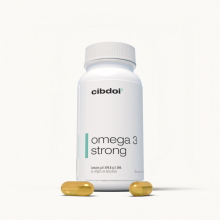Are Potatoes High in Omega-3?
Published:
Omega-3 fatty acids are incredibly important for health. The main omega-3s found in foods are ALA, EPA and DHA. Omega-3s provide many benefits for your heart, brain, eyes and more. This has led to interest in omega-3 content of different foods.
Contents:
Potatoes are one of the most widely consumed vegetables globally. But can potatoes provide any of the beneficial omega-3 fats? Let's examine the omega-3 levels in potatoes and compare to other high omega-3 foods.

Omega-3 Fatty Acids in Potatoes
The main dietary omega-3s are:
- ALA (alpha-linolenic acid) found in plant foods.
- EPA (eicosapentaenoic acid) and DHA (docosahexaenoic acid) primarily from seafood.
Potatoes contain extremely tiny amounts of the omega-3 ALA:
- A 100-gram serving provides just 18 mg of ALA.
- Percentage of calories from ALA omega-3 is 0.3%.
This ALA content is negligible compared to the daily recommendations. The adequate intake (AI) for ALA is 1.1 grams/day for women and 1.6 grams/day for men. One medium potato (173 grams) would provide a mere 9 mg of ALA, which is less than 1% of your daily needs.
Clearly, potatoes are not a significant source of omega-3 fatty acids.
Top Dietary Sources of Omega-3 Fatty Acids
If potatoes are too low in omega-3s to matter, what foods should you focus on for adequate intake of these healthy fats?
Here are some of the top dietary omega-3 sources:
Plant Sources of ALA
- Flaxseeds have the most ALA, providing over 6,000 mg per 100 grams.
- Chia seeds are also very high in ALA at 4,900 mg per 100 grams.
- Walnuts contain 2,500 mg of ALA per 100 grams.
- Hemp seeds provide 1,000–2,000 mg ALA per 100 grams.
Seafood Sources of EPA/DHA
- Wild salmon is very high in EPA/DHA at over 1,500 mg per 100 grams.
- Pacific sardines supply 1,500 mg omega-3s per 100 grams.
- Mackerel provides around 1,000 mg per 100-gram serving.
- Trout contains 600–1,000 mg EPA/DHA per 100 grams.
Other Sources
- Flaxseed oil is the richest source of plant-based ALA oil at nearly 9,000 mg per tablespoon.
- Fish oil capsules are a popular way to obtain concentrated EPA/DHA.
- Algal oil made from algae provides vegetarian DHA.
- Pasture-raised eggs have 110–200 mg omega-3s per egg.
Seafood, plant oils, nuts and seeds are among the best dietary sources for meeting omega-3 needs.
Why Are Omega-3 Fatty Acids Important?
Omega-3s provide wide-ranging benefits for health. Here are some of the top researched effects:
Heart Health
Omega-3s from seafood and plants:
- Lower triglycerides and blood pressure.
- Reduce atherosclerosis by improving artery function.
- Cut inflammation and oxidative stress levels.
- Decrease risk for heart attack, stroke and death from heart disease.
Brain Health
The omega-3 DHA:
- Is a key structural component of brain tissue.
- Enhances neurotransmission and synaptic plasticity.
- Improves learning ability, cognition and memory, especially with low intake.
Eye Health
DHA benefits eyesight:
- It's highly concentrated in the retina.
- Supports development of vision in infants.
- Reduces risk for age-related macular degeneration (AMD).
Mental Health
Omega-3 intake from seafood and plants:
- Lowers risk for depression and bipolar disorder.
- Improves outcomes in major depressive disorder.
- Benefits behavior and cognition in ADHD.
Anti-Inflammatory Effects
The anti-inflammatory properties of omega-3s alleviate symptoms of:
- Rheumatoid arthritis.
- Asthma.
- Inflammatory bowel disease (IBD).
- Type 1 diabetes.
Cancer Prevention
Higher omega-3 intake is linked to reduced risk for:
- Breast cancer, especially in postmenopausal women.
- Colorectal cancer.
- Prostate cancer.
In summary, omega-3 fatty acids provide essential health benefits and should be obtained through your diet or supplements.
Nutritional Profile of Potatoes
Although potatoes don't offer omega-3 fats, they do supply other key nutrients.
One medium boiled potato (173 grams) contains:
- 163 calories
- 37 grams carbs
- 4 grams fiber
- 3 grams protein
Nearly all the carbs come from starch. Potatoes have a high glycemic index but provide fiber, vitamins and minerals that benefit blood sugar control.
Potatoes are an excellent source of:
- Vitamin C: 45% DV
- Vitamin B6: 27% DV
- Potassium: 26% DV
- Folate: 16% DV
They also supply iron, niacin, thiamine, magnesium, phosphorus, zinc, copper and antioxidants like carotenoids and phenolic acids.
Some proven health benefits of potatoes include:
- Improved blood pressure and heart health.
- Lowered oxidative stress and inflammation.
- Increased satiety and weight control.
- Healthy digestion and gut microbiome.
- Benefits for blood sugar regulation in diabetics.
While potatoes lack omega-3 fats, they remain highly nutritious and health promoting.
Strategies to Increase Omega-3s in Potatoes
There are a couple strategies that may somewhat raise the omega-3 content when eating potatoes:
Choose Colorful Potatoes
Purple, red and blue potatoes contain higher antioxidant anthocyanins. Some research shows purple potatoes have slightly more ALA omega-3s than white potatoes, though still not significant amounts.
Add Omega-3 Toppings
Turn baked potatoes into an omega-3-rich meal by loading them with healthy toppings:
- Wild salmon
- Avocado
- Chopped walnuts
- Ground flaxseed
- Chia seeds
- Hemp hearts
Look for Biofortified Potatoes
Some companies are developing GM potatoes enriched with omega-3s from algal oil. However, these biofortified potatoes are still in research and not available to consumers yet.
Key Takeaways: Do Potatoes Provide Omega-3 Fatty Acids?
In summary:
- Potatoes do not naturally contain significant amounts of omega-3 fatty acids. They only offer trace quantities of ALA.
- The richest dietary omega-3 sources are seafood, plant oils like flaxseed oil, nuts like walnuts, and seeds like chia and hemp.
- Potatoes are highly nutritious despite negligible omega-3 content. They provide vitamins, minerals, antioxidants and fiber.
- You can somewhat raise the omega-3s in potatoes by choosing purple potatoes and topping with salmon, walnuts, etc.
- Omega-3 biofortified potatoes enhanced with algal oil are in development but not yet commercially available.
Conclusion
While potatoes are very low in omega-3 fatty acids, they remain one of the most nutritious vegetables you can eat. Ensure sufficient omega-3 intake by including fatty fish, flaxseeds, walnuts and oils in your diet, or taking a fish oil or algal supplement. Enjoy potatoes as part of a balanced diet with adequate amounts of anti-inflammatory omega-3 fats.















